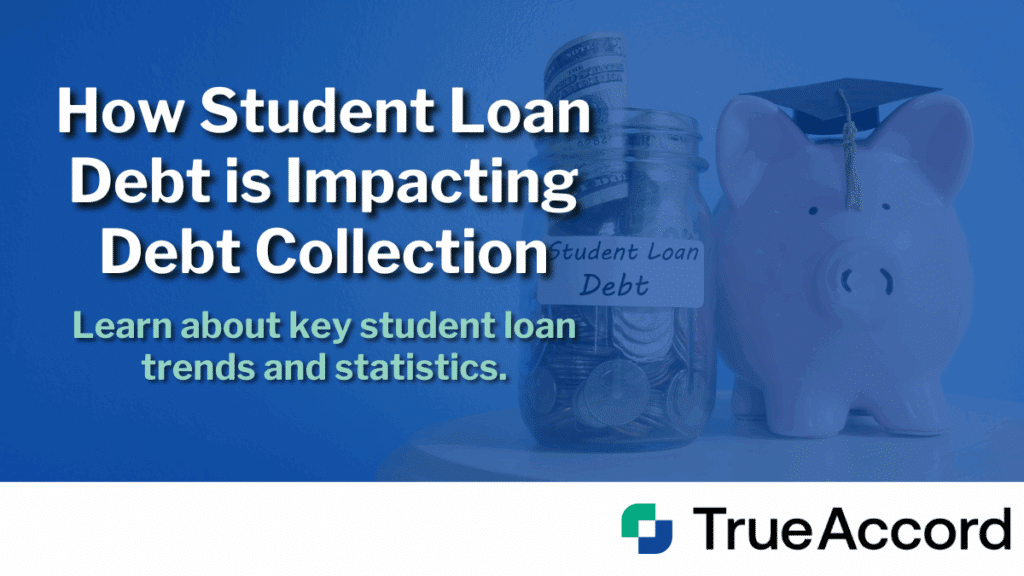The path to getting a higher education is a courageous decision that millions of Americans start each year when attending college. It sets the foundation for countless careers and drives personal growth that lasts a lifetime. However, education is expensive and paying back the loans can be challenging—an estimated 5.8 million student loan borrowers have delinquent accounts.
This number could get even higher with student loan forgiveness ending, interest on the debt resuming and shifts repayment options. Student loans and debt collection servicing have always shared a close relationship. And the current changes to the federal student loan system is primed to send shockwaves through debt collection services across the nation.
Learn how student loans have changed in 2025 and trends your business needs to look out for as the situation continues to evolve.
How Student Loans Have Changes in 2025
Before we dive into the implications for the debt collection industry, it’s important to understand some of the key changes recently made to federal student loans. The current administration signed into law the “One Big Beautiful Bill Act” on July 4th, 2025. This legislation overhauled the student loan system:
- Student Loan Forgiveness Paused: Borrowers on SAVE plans are seeing the end of payment forgiveness. Right now, payments are required and accruing interest on loans restarted on August 1st, 2025.
- Creation of Repayment Assistance Plan (RAP): RAP is an income-based plan for new borrowers that requires a minimum payment regardless of a person’s income level. This plan will only be approved for cancellation after 30 years of qualifying payments.
- Student Loan Payments Likely to Increase: With all the changes happening to the system, it’s very likely that borrowers will see their student loan payments increase. It’s estimated some Americans will see their student loans cost potentially a few thousand dollars more each year.
Student Loans and Their Impact on Debt Collection
One of the biggest and most immediate effects that student loans will have on debt collection solutions is a surge of collection activity. With loan forgiveness paused, the millions of delinquent accounts are going to be subject to collection efforts. To start, the federal government is putting increased focus on accounts that are 60 days or more delinquent.
This means that standard debt collection communications channels like phone calls and physical mail are going to be much more crowded for the foreseeable future. It’s also likely that some customers your business talks to have this type of financial obligation. That means no matter what debt type you’re collecting, there is more competition to get their attention through non-digital channels and less funds available to repay debts.
We Could See An Increase in Involuntary Collection Tools
When a consumer defaults on their student loan debt, the federal government has strong tools to help them collect payments. After 270 days pass without a payment being made, the government can garish up to 15% of the borrower’s paycheck. Any federal tax refunds can also be withheld and applied to the loan.
Any student loan accounts that are in delinquency or have defaulted can also be reported to national credit bureaus, causing damage to the borrower’s credit score. Consumers who are going through this process may be less likely to make payments on other debts while they try to keep up with student loans. The common thread is that more student loan borrowers could have reduced disposable income once all the changes take effect.
New Student Loan Rules Could Lower Credit Scores
Experts agree that the new student loan rules have a strong possibility of lowering credit scores for existing borrowers. Since the payment forgiveness that started shortly before COVID is ending, borrowers will likely need time to make payments as other costly necessities (like the rise of grocery costs) take their attention.
It’s possible that this will have widespread effects on consumer credit scores, making it more difficult for these borrowers to participate in the financial system. Specifically for student loans, a lower credit score makes it harder for borrowers to consolidate the debt at an affordable interest rate.
A lower credit score also makes it more difficult to access new lines of credit, a common tactic consumers use to pay off debt. Borrowers with a lower credit score will get higher interest rates on new loans, making it more expensive to get loans and more likely that payments made on debts will be in smaller amounts. To help navigate this challenge, debt collection services that offer consumers more payment options could have greater success.
Increase Your Collections Performance with an Industry Leading Platform
Student loan debt is primed to have a lasting impact on debt collection solutions. If you want to leverage AI that adapts to these situational challenges to collect more from happier people, TrueAccord is here to help.
If you want to empower your debt collection solutions with machine learning and a consumer-friendly digital experience, contact our sales team today.
